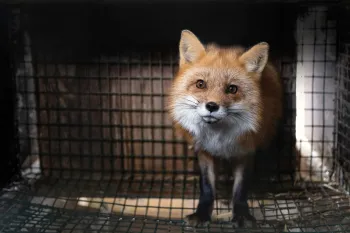BOSTON—Massachusetts lawmakers will soon face a clear choice: stand with two-thirds of their voters, who support ending the sale of fur from animals farmed for their pelts, or stand behind an industry that profits from cruelty. On Tuesday, Oct. 21, the Joint Committee on Environment and Natural Resources will hold a hearing on S.551 and H.990, companion bills sponsored by Senate Majority Leader Cindy Creem and Rep. Jack Patrick Lewis. This legislation would end the sale of fur products from animals raised in fur factory farms—operations where animals are confined in small wire cages and killed by electrocution, gassing or other inhumane methods designed to preserve their pelts. The bills are supported by a coalition of animal welfare organizations, including Humane World for Animals, MSPCA-Angell and Fur-Free MA. Massachusetts ranks third in the nation for fur sales, behind only New York and Texas, according to U.S. Census data.
A recent survey by Colorado State University’s Animal-Human Policy Center found that 66% of Massachusetts residents support legislation to stop the sale of new clothing and other products made with fur from animals raised in captivity. The survey results suggested broad political and moral backing for the proposed legislation—only 13% said that they would be less likely to vote for a lawmaker backing such a ban, while nearly half said they would be more likely to support that candidate.
“The message from voters is clear: Massachusetts residents do not want to be complicit in these inhumane practices,” said Senator Cindy Creem (D–Newton). “This legislation will help better align our laws with the values shared by the majority of our constituents.”
“Massachusetts has an opportunity to lead with compassion,” said Rep. Jack Patrick Lewis (D–Framingham). “We do not want animals suffering in cages just so their fur can be sold for fashion accessories and aesthetics. This bill ensures our state’s laws and economy aren’t tied to an industry that subjects innocent animals to such unimaginable suffering.”
The hearing comes less than a year after a large-scale animal rescue at the Grand River Fur Exchange in Ohio made national headlines. When the fur farm’s owner died in late 2024, hundreds of foxes, raccoons, wolf-dog hybrids, skunks, opossums and coyotes were discovered living in filthy wire-bottom cages, many with severe injuries or missing limbs, with little to no protection from the frigid conditions.
This legislation targets fur products sourced from animals held in similar factory-farm conditions, not from wild-trapped animals, secondhand fur or fur used for religious purposes. It does not apply to products such as leather, shearling and wool.
“The animals rescued from Ohio were emaciated and severely dehydrated, and several animals were found deceased and covered in snow,” said Preyel Patel, Massachusetts state director for Humane World for Animals, formerly the Humane Society of the United States. “That kind of suffering is inherent to the fur industry. Massachusetts voters don’t want any part of it. This legislation gives our state the chance to uphold voters’ values and end the sale of products that are inseparable from extreme and unnecessary animal cruelty.”
"Animals like foxes suffer horribly in fur factory farms and are denied everything natural to them, solely to be killed for fashion products that can easily be replaced by humane, eco-friendly alternatives,” said Kara Holmquist, director of advocacy at the MSPCA. “Massachusetts voters have demonstrated time and again that animal cruelty has no place in our Commonwealth, and we urge lawmakers to break ties with this horrific industry for good by prohibiting the sale of new fur products.”
If enacted, Massachusetts would join California and numerous communities within Massachusetts—including Wellesley, Weston, Brookline, Plymouth, Cambridge, Lexington, Attleboro and Arlington—that have already acted to restrict new fur sales. The upcoming hearing comes just weeks after global mass media company Condé Nast, parent company of Vogue and Glamour, announced a fur-free policy for all its publications.
“Local communities have proven that compassion and commerce can coexist,” said Liza Oliver, founder of Fur-Free Massachusetts. “Massachusetts should follow their lead and ensure humane standards apply statewide.”
The Oct. 21 hearing will be held at the Massachusetts State House.



